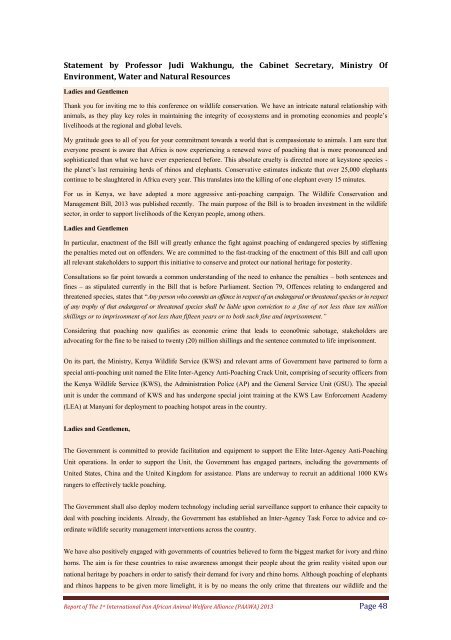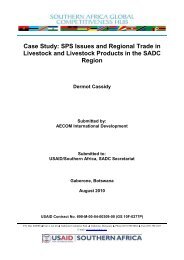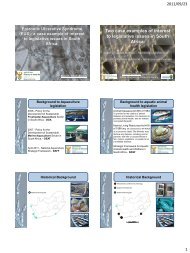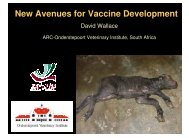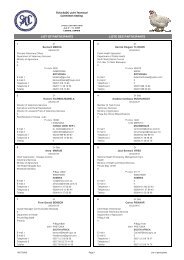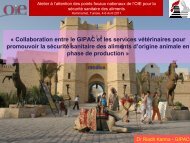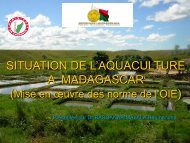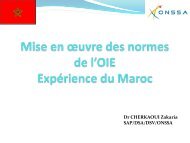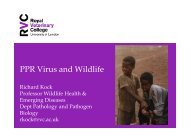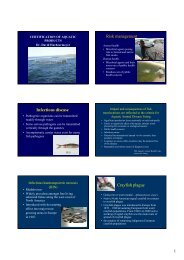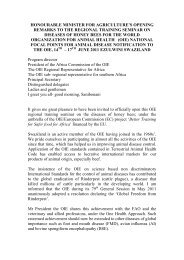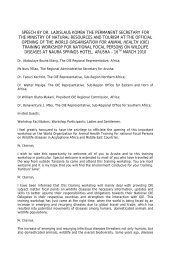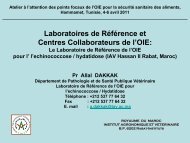1st INTERNATIONAL PAN AFRICAN ANIMAL WELFARE ALLIANCE ...
1st INTERNATIONAL PAN AFRICAN ANIMAL WELFARE ALLIANCE ...
1st INTERNATIONAL PAN AFRICAN ANIMAL WELFARE ALLIANCE ...
Create successful ePaper yourself
Turn your PDF publications into a flip-book with our unique Google optimized e-Paper software.
Statement by Professor Judi Wakhungu, the Cabinet Secretary, Ministry OfEnvironment, Water and Natural ResourcesLadies and GentlemenThank you for inviting me to this conference on wildlife conservation. We have an intricate natural relationship withanimals, as they play key roles in maintaining the integrity of ecosystems and in promoting economies and people’slivelihoods at the regional and global levels.My gratitude goes to all of you for your commitment towards a world that is compassionate to animals. I am sure thateveryone present is aware that Africa is now experiencing a renewed wave of poaching that is more pronounced andsophisticated than what we have ever experienced before. This absolute cruelty is directed more at keystone species -the planet’s last remaining herds of rhinos and elephants. Conservative estimates indicate that over 25,000 elephantscontinue to be slaughtered in Africa every year. This translates into the killing of one elephant every 15 minutes.For us in Kenya, we have adopted a more aggressive anti-poaching campaign. The Wildlife Conservation andManagement Bill, 2013 was published recently. The main purpose of the Bill is to broaden investment in the wildlifesector, in order to support livelihoods of the Kenyan people, among others.Ladies and GentlemenIn particular, enactment of the Bill will greatly enhance the fight against poaching of endangered species by stiffeningthe penalties meted out on offenders. We are committed to the fast-tracking of the enactment of this Bill and call uponall relevant stakeholders to support this initiative to conserve and protect our national heritage for posterity.Consultations so far point towards a common understanding of the need to enhance the penalties – both sentences andfines – as stipulated currently in the Bill that is before Parliament. Section 79, Offences relating to endangered andthreatened species, states that “Any person who commits an offence in respect of an endangered or threatened species or in respectof any trophy of that endangered or threatened species shall be liable upon conviction to a fine of not less than ten millionshillings or to imprisonment of not less than fifteen years or to both such fine and imprisonment.”Considering that poaching now qualifies as economic crime that leads to econo0mic sabotage, stakeholders areadvocating for the fine to be raised to twenty (20) million shillings and the sentence commuted to life imprisonment.On its part, the Ministry, Kenya Wildlife Service (KWS) and relevant arms of Government have partnered to form aspecial anti-poaching unit named the Elite Inter-Agency Anti-Poaching Crack Unit, comprising of security officers fromthe Kenya Wildlife Service (KWS), the Administration Police (AP) and the General Service Unit (GSU). The specialunit is under the command of KWS and has undergone special joint training at the KWS Law Enforcement Academy(LEA) at Manyani for deployment to poaching hotspot areas in the country.Ladies and Gentlemen,The Government is committed to provide facilitation and equipment to support the Elite Inter-Agency Anti-PoachingUnit operations. In order to support the Unit, the Government has engaged partners, including the governments ofUnited States, China and the United Kingdom for assistance. Plans are underway to recruit an additional 1000 KWsrangers to effectively tackle poaching.The Government shall also deploy modern technology including aerial surveillance support to enhance their capacity todeal with poaching incidents. Already, the Government has established an Inter-Agency Task Force to advice and coordinatewildlife security management interventions across the country.We have also positively engaged with governments of countries believed to form the biggest market for ivory and rhinohorns. The aim is for these countries to raise awareness amongst their people about the grim reality visited upon ournational heritage by poachers in order to satisfy their demand for ivory and rhino horns. Although poaching of elephantsand rhinos happens to be given more limelight, it is by no means the only crime that threatens our wildlife and theReport of The 1 st International Pan African Animal Welfare Alliance (PAAWA) 2013 Page 48


